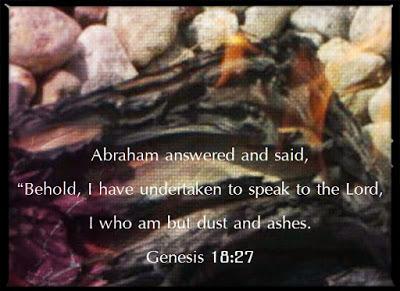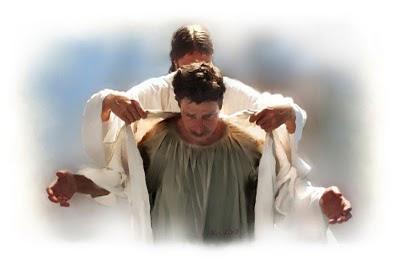
Do you realize that in the Creation account in Genesis 1 and 2, the first time God did not speak something into existence but personally and intimately used His own 'hands' was when He created Adam? He spoke the world, the sun, moon, stars, animals, lands, oceans, birds, into existence but made Adam from dust and His own breath. Interesting.
It's also interesting that we are made of the dust from the ground. Dust appears frequently in the Bible. It didn't take long from the gentle creation scene in Genesis 2, to go to a dusty curse in Genesis 3.
By the sweat of your brow you will eat your food until you return to the ground, since from it you were taken; for dust you are and to dust you will return." (Genesis 3:19).
Ever since sin came into the world through Adam we all return to dust.
All go to one place. All are from the dust, and to dust all return. (Ecclesiastes 3:20)
Ever since God cursed the ground (dust) Adam was made from, dust represents death. The wages of sin is death. (Romans 6:23). Therefore it is fitting that we repent in dust and ashes.
"I have heard of You by the hearing of the ear; But now my eye sees You; Therefore I retract, And I repent in dust and ashes." (Job 42:5-6)
What is the meaning of sackcloth and ashes?
Very simply, sackcloth and ashes were used as an outward sign of one’s inward condition. Such a symbol made one’s change of heart visible and demonstrated the sincerity of one’s grief and/or repentance. It was not the act of putting on sackcloth and ashes itself that moved God to intervene, but the humility that such an action demonstrated (see 1 Samuel 16:7). God’s forgiveness in response to genuine repentance is celebrated by David’s words: “You removed my sackcloth and clothed me with joy” (Psalm 30:11).Abraham spoke of dust in a positive way. Knowing one is made of dust and is destined for death (before eternal life in glory) is a simple declaration of an understanding of who we are before a Holy God. We are sinners, part of His creation.
Then Abraham spoke up again: "Now that I have been so bold as to speak to the Lord, though I am nothing but dust and ashes, (Genesis 18:27)
But because of the relationship He has entered into with his saints, we can approach Him humbly but boldly like Abraham did.
Though Adam fell short of living a sinless life, Jesus accomplished living that sinless life that's required for dwelling with God. Jesus shed His own blood in a supreme sacrifice to God and died in humiliation on the cross. Buried, Jesus rose to life when God resurrected Him in joy, pleased with Jesus' sacrifice. Jesus is now ascended to the Father, but He is coming again in wrath and glory to judge the living and the dead. This is the Gospel, the Good News of Jesus Christ for sinners.
We may die before He raptures the remaining saints alive to glory, though we may indeed return to dust in that death, He will resurrect us in joy. He will bring His Bride home to celebrate life in heaven with the Father of Lights. There will be no more sin, thus ending the need to repent in dust and ashes. No more sackcloth. There will be no more cursed dust of the ground.

Lars Justinen "Robe of Righteousness"
You turned my wailing into dancing; you removed my sackcloth and clothed me with joy, (Psalm 30:11)
Hallelujah, praise the Father!
